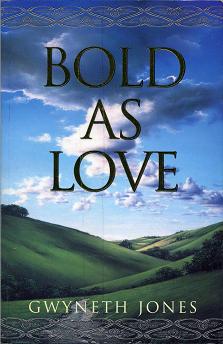
Bold as Love
Gwyneth Jones
403 pages
published in 2001
Bold as Love is the second book in my year of reading women sf challenge, chosen partially because Niall Harrison was also going to read it in February, for Torque Control's similar project. For a long time I wondered whether I had made a mistake selecting this book, picking it up and putting it down again, not getting to grips with it. Didn't like the writing, didn't believe the world building or plot, couldn't care for the protagonists. Only the fact that I was reading this as part of a self imposed challenge kept me going. That, and the feeling that a novel which had won the Arthur C. Clarke Award and which was commercially succesful enough to span four sequels, must have something in it that I was missing.
Perhaps it was just that this was a novel I needed to immerse myself in fully, not read in bits and chunks here and there during the daily commute. Gwyneth Jones is not a writer who grabs you from the first sentence -- at least she isn't for me. She writes her characters from the outside in, rather coolly and hence it takes more time to get into her characters' heads than it would with a more "warmer" writer. I had the same sort of problems with the future England Bold as Love predicted, which at first seemed dated and implausible, more sixties New Wave than early 21st century science fiction.
Bold as Love's future England is part of a Britain more or less peacefully dissolving itself, against a background of ecological catastrophe engulfing Europe, never really explained. There are some hints of global warming, some mentions of eco scandals -- BSE, foot and mouth -- that had recently happened or were happening when Jones wrote the novel, but nothing all that concrete. Despite all the chaos and dislocation this environmental stress supposedly visits on England, it barely impacts on the protagonists' lives.
Probably it's because our heroes are countercultural royalty, two rock princes and the princess they both love: Ax Preston, Sage Prender and Fiorinda, impossibly young, ethereal, a rockstar in her own right. All of them came together on one of the last big rock festivals to celebrate Dissolution Summer. The government meanwhile, or what remains of it while Britain dissolves, is running consultation sessions with all the heavies of the counterculturals, or at least those bothering to show up. The old system is dying and the young, ambitious men and women one or two rungs below the real power in England want to use the counterculturals to replace it, to get themselves into power. Ax certainly knows he's being used, but he has his own plans, Sage knows but doesn't care, while most of the other, lesser countercultural stars are just there for a laugh; Fiorinda is there but has bigger problems. But when of the lesser stars stages a coup and takes over the counter, all three are drafted to form part of his government to lead the green revolution.
Bold as Love revolves around the adventures of Ax, Sage and Fiorinda as they have to solve the problems of an England where the counterculture isn't anymore, but in control of the country. These are huge, from more radical greens wanting to destroy everything modern to Muslim separatists in Yorkshire, but are all sorted out through the same solutions, by holding a rock festival. The power of rock and the genius of Ax, Sage and Fiorinda conquers all.
The plot's not the heart of the book; that's obviously the relationship between our three heroes, one that every review of Bold as Love insists is like that between Arthur, Lancelot and Guinevere, though I find that too pat. These three lovers don't need to destroy themselves just because they're two men loving the same woman. Gwyneth Jones instead makes this a much more mature love triangle, in the end based on mutual respect and love between the two men as well as between each of them with Fiorinda. It's in the scenes that she concentrates on the deeping of these bonds that Jones is at her best and Bold as Love convinces the most.
At first glance Bold as Love looked like a late and out of date example of New Wave nihilism, but thinking about it when reading it I realised that instead it mirrors the anxieties of late nineties Britain, when the optimism of early New Labour had long since vanished, the country resigned to being rundown and slightly shit, but still with a bit of the glamour of Cool Britannia left, that idea that rock bands could influence politics by rubbing shoulders with the politicians. The counterculture as well aren't sixties hippies, but the much harder nineties ecological movement, the people who'd sit out in the woods for months on end to stop the construction of another highway. Jones takes these elements and puts them in essentially a fantasy tale.
Bold as Love didn't quite convince me as a novel, but I think that was as much me as the novel. Try it yourself.
Webpage created 27-02-2011, last updated 22-07-2011.